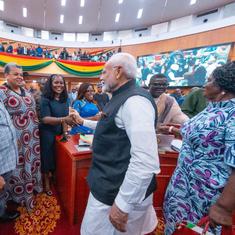Tamil Nadu: Artefacts dated to 580 BCE hint at script continuity from Indus Valley Civilisation
The findings at the site in Keezhadi, near Madurai, push back the date of Tamil Brahmi script, which is the precursor to modern Tamil, by another century.

Artefacts found at the archaeological site in Keezhadi, about 12 km from Madurai in Tamil Nadu, have been dated to 580 BCE, with “graffiti marks” on them pointing to a possible continuity in script from the Indus Valley Civilisation. The findings were made in a report by a team that conducted excavations at the site.
The report is significant because Dravidian movement politicians in Tamil Nadu have long claimed that the people of the Indus Valley Civilisation could be ancestors of the modern Tamils. However, archaeological and genetic evidence to establish the link was not strong so far. None of the three earlier major excavations in the region had provided strong evidence of an ancient urban settlement – a significant feature of the Indus Valley Civilisation.
The Keezhadi site, however, has so far provided overwhelming evidence of an urban settlement since excavation began in 2015.
“One kind of script that survived between the disappearance of Indus script and the emergence of Brahmi script is called as graffiti marks by the scholars,” the report said. “These graffiti marks are the one evolved or transformed from Indus script and served as precursor for the emergence of Brahmi script. Therefore, these graffiti marks cannot be set aside as mere scratches. Like Indus script, this also could not be deciphered till date.”
Earlier excavations at Adichchanallur, Korkai, Alagankulam, Kodumanal, Karur, Teriruveli, Uraiyur, Mangulam, Perur and other places yielded such type of graffiti inscribed potsherds.
The Indus script was used by the people of the Indus Valley Civilisation, which existed in north-west India between 5,000 BCE and 1,500 BCE. Scholars have speculated that it could be that of a Dravidian language.
The report said beyond Tamil Nadu, these marks have been recovered from the sites such as Tissamaharama, Kantarodai, Manthai and Rithiyagama in Sri Lanka. “Of the graffiti shreds collected from the sites of the Indian sub-continent, more than 75% of the symbols are traced from Tamil Nadu alone,” a press release on Thursday said.
The report added that 56 potsherds were recovered from the excavation conducted by the Tamil Nadu State Archaeology, with inscriptions in Tamil-Brahmi, the precursor to modern Tamil. “The recent scientific dates obtained for Keezhadi findings push back the date of Tamil-Brahmi to another century i.e. 6th century BCE,” the report said.
The artefacts also indicate a high level of literacy among the people who lived in Keezhadi. The report said:
“Tamil-Brahmi letters as part of inscriptions are found engraved on the shoulder portions of the earthen vessels. In general, these letters were inscribed when the pot is in leather condition or were inscribed/engraved after the pot became dry. The letters engraved in leather condition could be made only by the potters at the time making pots. In the case of Keezhadi examples, they were all post-firing in nature and were engraved by the owners after purchasing the pots. The representation of various styles of writing also suggests this view. It clearly suggests that the literacy level of the contemporary society that survived in 6th century BCE.”
The report added that the extent of pottery artefacts found at the site suggested that there could have been a pottery-making industry in the complex.
Tamil Nadu Archaeology Department Commissioner T Udhayachandran said that the 2018 season of the excavations ran for about six months. The state department took over the digs after the Archaeological Survey of India gave up on the excavations after three seasons of work that began in 2015.
Earlier, in 2016, the ASI had found artefacts that were dated to 200 BCE.
Recent genetic studies published in scientific journals Cell and Science have reiterated the long-held views that the people of the Indus Valley moved east and southwards following the decline of the civilisation from around 2000 BCE.
An earlier version of this article wrongly mentioned the date of the artefacts as 583 BCE.
Now, follow and debate the day’s most significant stories on Scroll Exchange.









